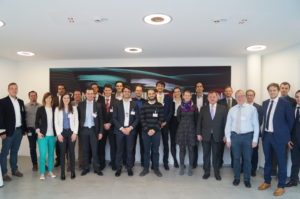During the recent meeting, four working groups presented their findings and shared their progress on issues high on the energy agenda including: technological innovations, the energy transition, alternative funding models and digitalisation of the electricity market.
“This has only been possible because of the commitment of the participants as well as the support of our board and external experts such as Daniel Kroos. Furthermore, we are happy to have engaged members such as APG, who welcome us as guests for events like this.”
The group working on the impact of the energy transition stressed the importance of the merger of the consumer and the producer (prosumer), and the resulting need for improved and smart grids as well as higher coordination among the various stakeholders. Another group looking at upcoming technological innovations, focused on the storage of energy in urban surroundings with a special emphasis on pumped-storage power plant. They identified the rising population of mega-cities as key reason energy storage will be one of the major issues in these hubs over the next century.
Different models for investment and funding were analysed by a third group. Their findings, while still work in progress, suggested that all existing technologies in the electricity market need additional funding as none of them are able to produce at the current market price. As a result, the question of a common European energy strategy emerges as well as doubts as to whether the 'energy only market' is already fully functional.
The fourth group tackled questions concerning the digitalisation of the electricity industry and the impact of digital services on the electricity supply chain. Their research found that digital services have the potential to increase the consumers' utility while lowering prices. Nevertheless, this development will put pressure on the downstream segments of the market and might therefore be especially beneficial for small and highly specialised start-ups.
Following their presentations, the participants of the YEP Programme engaged in an open discussion which was also joined by Professor Günther Brauner, Dr Robert Kobau and Dr Stephan Unger from the programmes board as well as Daniel Kroos form the OSCE. The group were joined remotely from the Council’s office in London by Sophie Rose, Head of the Future Energy Leaders’ (FEL) Programme, who provided valuable insights as well as thoughts about the YEP Programme's potential going forward.
The group was treated to a tour of the power grid control facility by Dr Michael Weixelbraun, Assistant to the APG Executive Board and an expert on grid dynamics, who is also involved in the YEP programme. He gave an overview of the day to day operations as well as the various crisis management mechanisms in place at the facility.
All of the findings were discussed by the group in order to help shape current issues over the coming weeks. The young professionals also presented their projects during the General Meeting of the Austrian member committee.






